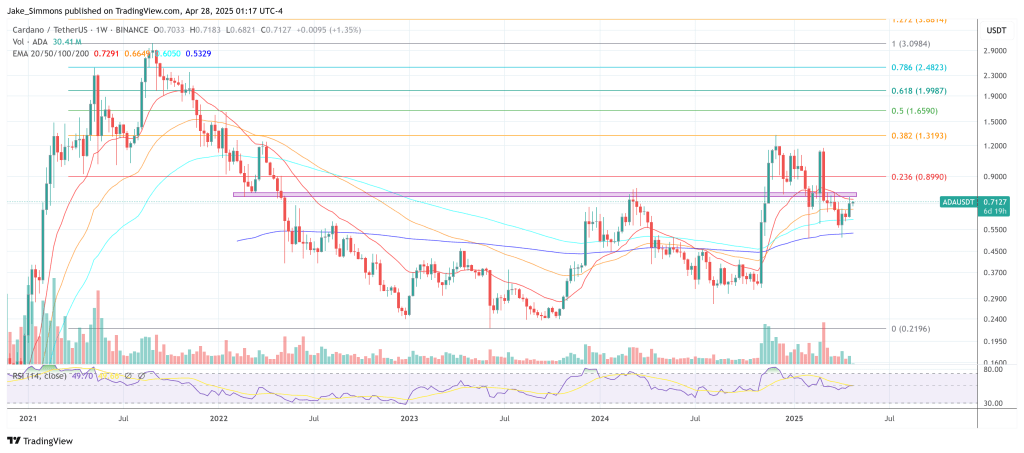Cardano creator Charles Hoskinson has warned that the blockchain’s decade-long experiment in decentralized governance could stumble unless holders approve a “package” budget that keeps his company, Input Output Global (IOG), at the center of the protocol’s next growth phase—a phase he believes could propel ADA to between $3 and $10.
Speaking during a livestream on the weekend, the visibly hoarse founder told viewers that he has “drawn a line in the sand” after spending the past five years “working for free” on Cardano-core code. The livestream was triggered by fierce debate over a treasury-funded interim budget that must be reconciled by elected delegate representatives (DReps) before the network’s first on-chain fiscal year closes.
“We say, hey, 50, 60, 70 million [ADA] and it could double, triple, quadruple the size of the ecosystem,” Hoskinson said. “We could be looking at $3 ADA, $5 ADA, $10 ADA.”
Hoskinson argued that Cardano can only stay relevant if the community backs a cohesive engineering roadmap rather than cherry-picking line items for cost savings. The document on the table—already endorsed in principle by a majority of DReps—sustains roughly 150 full-time IOG engineers and dozens of research scientists.
It funds work on new scalability primitives such as state channels, roll-ups and new iterations of Leios, alongside continued investment in the Mithril light-client ecosystem, privacy-preserving partner chains and interoperability tooling that Hoskinson says are critical for attracting developers and total value locked. “You’re funding the IOG vision,” he said. “You’re getting my time, my company’s time, our strategy. The price is the price.”
IOG, which wrote every line of Cardano’s original codebase, stopped receiving any revenue tied to its 2015 token-generation event when those contracts expired in 2020. Since then, the firm has financed protocol upgrades and market-bridging infrastructure “out of pocket,” Hoskinson said, including tens of millions of dollars to list native Cardano assets with custodians and exchanges.
A Cardano Treasury With Limits
Cardano’s on-chain treasury now holds about 1.7 billion ADA. In February, 72% of voting wallets approved a net change limit that caps the forthcoming reconciliation to 350 million ADA. Hoskinson applauded that guard-rail but reminded holders that it is up to DReps to allocate within the ceiling—and to decide whether IOG’s ask constitutes value.
He likened the current fight to building a smartphone “by committee”: “You have a camera, CPU, memory, antennas… Could you imagine how difficult it would be to build a phone by committee? You’d never build a competitive product.”
If DReps vote down the bundle or fund only fragments, IOG will “responsibly start pulling out” after completing the Leios upgrade, reallocating engineers to other ventures—including Midnight, a privacy-focused partner chain that Hoskinson believes will bring “millions of users” and make Cardano “the largest AVS system” in crypto. “You can fire the vendor,” he conceded, but warned that gutting the core team risks losing one of “the most elite engineering and research teams in the world for cryptocurrencies.”
Hoskinson rejected accusations that the proposal contradicts Cardano’s decentralization ethos. Decentralization, he said, does not mean the absence of leadership; it means the right to hire—and fire—custodians of a shared product vision. “There is nothing contradictory about a decentralized ecosystem hiring somebody to take care of your vision and product for a time period,” he said.
Still, he acknowledged frustration with what he called the ecosystem’s “political learned helplessness,” urging delegates to move from social-media vitriol to concrete budget decisions: “Twitter’s not reality… let’s build the budget, vote yes or no, and move on.”
With the reconciliation window opening, ADA holders face a stark choice: retain IOG as strategic steward at the quoted cost, or redirect treasury funds to newer collectives such as Pragma, TXPipe or DC Spark and accept the risks of a slower, more diffuse development pace. Hoskinson framed the decision in blunt economic terms:
“I’m not Elon Musk asking for a $50 billion pay package. I’m just simply saying I want you to cover the expenses of my engineers and leave a little profit there for us… If you like that, vote yes. If you don’t, vote no—but then pick another person to do this.”
At press time, ADA traded at $0.71.

from Bitcoinist.com https://ift.tt/sx5nNrk
Comments
Post a Comment